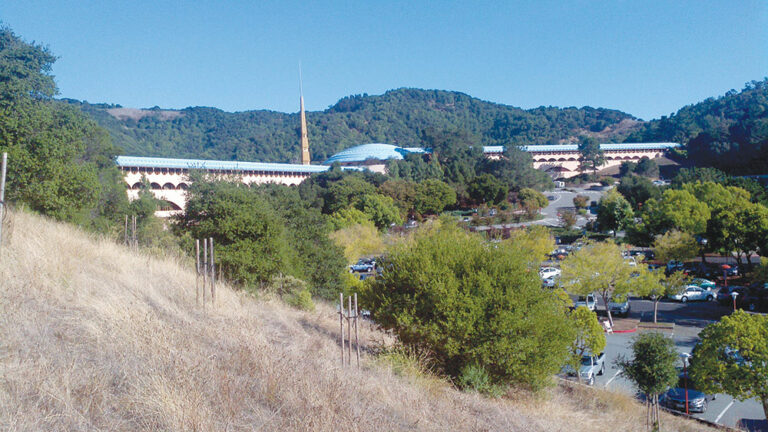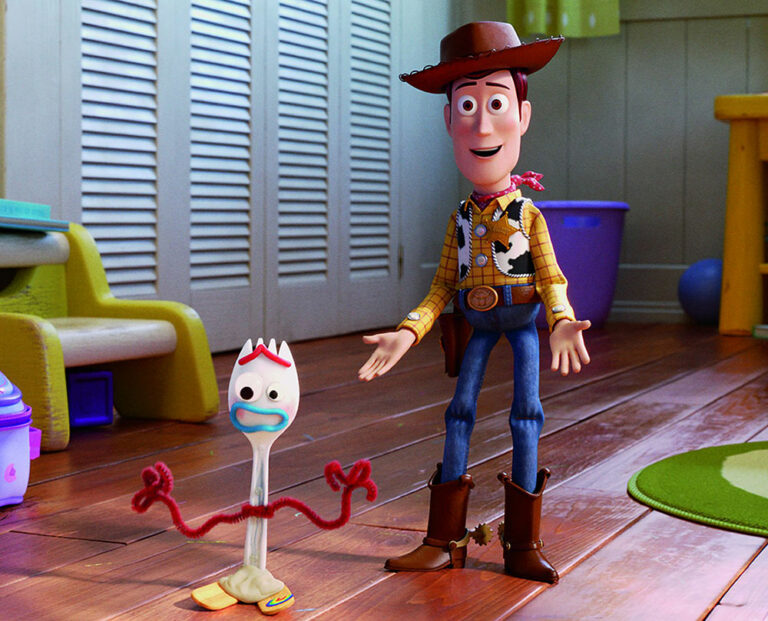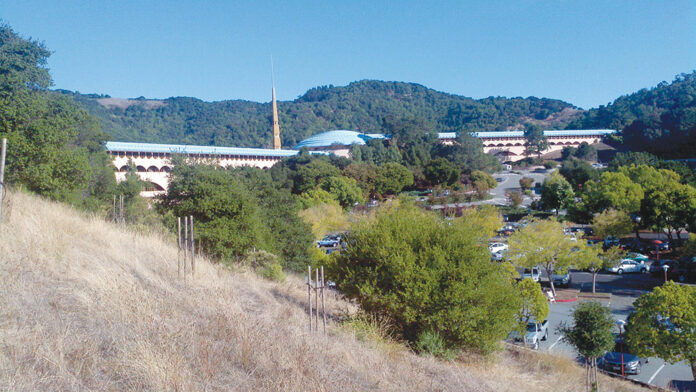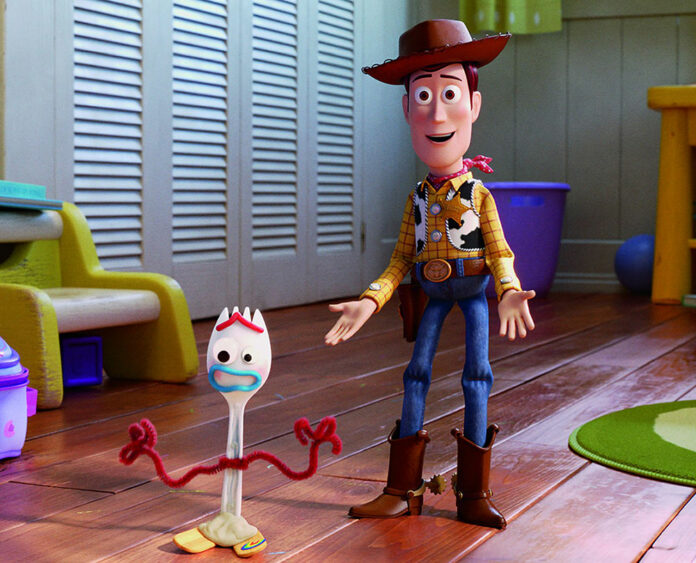It’s a busy Saturday morning at the San Quentin Rifle Range as members from law enforcement agencies around Marin County receive instructions in use-of-force and weapons training. The facility is owned by San Quentin State Prison, but is used by the Marin County Sheriff’s Office (MCSO) and other local agencies. Officers gather in a training room filled with gear and safety-first posters and postings. There they load their weapons with live ammunition, strap on noise-canceling headphones and head for the range down the hall.
Now two uniformed MCSO officers stand in the open firing range while an instructor in a bright red shirt barks commands at them. The range is reminiscent of the inside of a parking garage—a vast expanse of sloping concrete that looks like an elongated auto ramp. Numerous bad-guy targets are set up for the police officers.
Officers are required to receive ongoing training in use-of-force protocols and today’s instructions focus on encounters with two suspects—one with a knife, the other with a gun. With the trainer behind them, the officers stand side by side and fire their service Glocks at the target, re-load and do it again. Shell casings hit the cement floor with a clattering sound. Like so many real-time encounters on the streets, the entire exercise is all over in a few short minutes.
The training is nothing new but what is new is a proposed state law, AB 392, that sets out to reframe use-of-force parameters for California peace officers. It’s a controversial bill largely driven by the 2017 police shooting of Stephon Clark in Sacramento. Clark was shot and killed by police officers who reportedly mistook his cellphone for a weapon. The officers were cleared in a shooting that prompted months of protest in the capital city that led to the introduction of AB 392 last year.
At the center of the debate over use-of-force protocols in Sacramento is Marin County Sheriff Robert Doyle. In his 50 years as a Marin County sheriff, Doyle’s seen everything from the 1970 Marin County Courthouse shootout to the Marin County floods of 2018.
The Pacific Sun recently sat down with Doyle at his office in San Rafael to talk about AB 392 and other bills that have emerged from Sacramento in recent years, and to take the pulse of the MCSO. He’s on the legislative committee of the California State Sheriff’s Association and as such is directly involved in negotiations over the bill.
“There’s two things that you don’t want to see being made,” Doyle says. “Sausage and laws.” The Clark shooting and its aftermath, he says, are evidence of what he calls a “clamor in Sacramento to write laws” whenever there’s a police-related incident that raises questions about use-of-force policies.
Of the Clark shooting he says, “there were a lot of factors in that shooting that provide it was a justified shooting—but legislators don’t seem to care about it.”
He describes a Democratic supermajority in Sacramento as not being anti-police, but as being immediately opposed to any bills that come before it that are designed to enhance or reinforce law enforcement in the state. “I think you are seeing the legislature doing things that affect law enforcement negatively,” he says. “I don’t want to bash all of the legislators, but it’s interesting that they have a lower approval rating even than our very unpopular president.”
The basic controversy over AB 392 centers on the distinction between use-of-force that’s “reasonable” versus what is “necessary.” In the Clark shooting, the suspect was hit with seven bullets, killing him.
But Doyle says it was, as originally proposed, a “terrible bill because it defined what ‘necessary’ was.” To law enforcement officers, it meant that “unless you are under fire, you can’t use lethal force”—a standard that’s unreasonable from the perspective of law enforcement, Doyle says. “The peace officer is a human being out there risking his or her life every day,” he says. “Other people are counting on him or her to protect them. It was a terrible piece of legislation.”
That’s when Gov. Gavin Newsom got involved. Doyle credits the governor for stepping in to try and make it a better bill for law enforcement. Plus, he says, “I don’t think there were the votes to pass it as written.” In the end, the law enforcement lobby headed by Doyle didn’t support it but also “sort of agreed to not oppose 392 because it would just come about again.”
He says it’s now a bill law enforcement can live with. The sheriff’s lobby hasn’t endorsed it or opposed it. Though the bill was prompted by the Clark shooting, there hasn’t been a high-profile use-of-force case in the state since the shooting occurred in 2018. “The governor’s staff made a great point,” Doyle notes. “There’s no controversial issue out there right now—this is a perfect time to resolve this.” The bill is now less focused on interpreting the definition of “necessary force” and when it’s allowed to be used. It passed the Senate committee on public safety on June 18 with a 6-0 vote.
Doyle’s seen use-of-force standards evolve over his half-century with the MCSO. “The standard has changed,” he observes. “A lot of things have changed, but years ago the standard was totally different.” The old standard was pretty cut-and-dry: If an officer didn’t see something that might be construed a threat to his or others’ safety, the officer couldn’t use lethal force. Then, as Doyle recalls, the courts started to get involved in use-of-force cases and started to look at the state of mind of the police officer at the time of the shooting, among other factors. Beginning roughly in the 1980s, the use-of-force standard started to “favor” law enforcement. Even if lethal force was found to be unnecessary under the circumstances, the officers had a reasonable expectation that it was necessary at the time of the incident.
In the Clark case, for example, even though the suspect was carrying a cellphone and not a gun, the perspective of the officers—and the conclusion of subsequent investigations into the shooting—was they believed he was, and the shooting was therefore reasonable even if it wasn’t necessary.
One problem amplified by the Clark case is the public perception, based largely on citizen-posted videos that weren’t a phenomenon until recently, that there’s been a big increase in police shootings in recent years. Doyle makes this point. Organizations such as Black Lives Matter highlight controversial police shootings as being the tip of an iceberg of police force-instigated injustices targeting non-white citizens.
“But if you look at the statistics,” says Doyle, “there aren’t as many police shootings as some of these groups would like the public to believe, and especially of unarmed people and of people of color.” He further notes that when it comes to murders, most occur between members of the same race. “Most crimes like that are white on white or black on black,” he says. “Of course there are egregious examples, and of course there are bad shootings. The problem is that everyone these days paints everything with a broad stroke.”
The debate over 392 comes at what might be considered an inflection point in law enforcement in California. Last year the legislature passed AB 1421, a transparency bill that unwound California’s long-standing status as having the most restrictive public access laws in the nation when it came to peace officers’ personnel records and records of complaints against officers. As a whole, the law enforcement community in California was opposed to 1421, as was Doyle, who says his position was that he didn’t believe “complaints that weren’t sustained should be made public. It’s unfair to the officer or the deputy.” His department, he says, has seen an uptick in records’ request since AB 1421; one such request has yielded the full investigative report of Marin General Hospital incident that ended with the death of a mentally-ill suspect. All officers involved in that tragedy were cleared of wrongdoing.
Doyle he also sees some value to AB 1421, or the transparency it does provide the public, at least when it comes to public perception of agencies and their disciplining of officers. Doyle recalls that in 2013, an MCSO officer fired off numerous shots in a reckless manner. Doyle and the MCSO as a whole came under intense fire from police accountability activists for allegedly covering up the officer’s misdeed. Because of the pre-1421 restrictions on law enforcement officials to release personnel files, “we were accused of whitewashing it,” says Doyle. “Even though we had fired the employee, we couldn’t talk about it.”
The county as a whole has one of the lowest rates of incarceration and overall crime rate of any county in the state, and Doyle notes that officers come from around the state and to serve here. It’s a mostly white force that reflects the demographic of Marin County, he says. About 15 percent of the force is comprised of African American officers, he says.
Doyle oversees a department of around 215 sworn officers and works out of an expansive office in Marin Commons, which houses the MSCO and some Kaiser Permanente office space.
All police agencies have a culture and if there’s one at MCSO, it’s driven by Doyle, who joined the force after serving in the Army and was sworn in as a patrol sergeant in 1969. He moved through the ranks and became sheriff in 1996.
Interactions and interviews with MSCO officers reveal a boss who demands respect for the chain of command and who drums the message into his officers to get out of their patrol cars and get to know the communities they serve.
Patrol officers don’t just represent MSCO as an agency, they’re told— they represent Doyle himself when they’re on duty. He’s known to counsel his force on knowing the difference between the spirit and the letter of the law and acting accordingly, says one deputy as he describes to a reporter the nuanced police work that goes in to, for instance, dealing with a meth-head with outstanding warrants, but who would be better served by going to the hospital than to jail because of a failure to appear in court. Sometimes, the warrant can wait for the perpetrator to first deal with their immediate health issues.
Doyle’s community-policing focus is a critical issue for the MSCO. Most of the 215 officers who patrol the streets don’t live in Marin County, owing to the outsized cost of living in the county. (Doyle lives in Novato.) Officers in Marin County are paid below the median average for the North Bay, a sticking point for the local union that represents the force and it currently negotiating a new contract with the county.
To accommodate the fact of Marin’s pricey housing costs and how that impacts on law enforcement, when MCSO moved its headquarters into the new building, it included numerous bunks and a no-frills but pretty cozy TV lounge for deputies. The MCSO headquarters now sleeps up to 42 officers over a 24-hour-period. It’s workable, if not ideal. There’s no residency requirement for officers who are nevertheless encouraged to get to know the residents and communities they patrol. Strongly encouraged, as one deputy put it to a reporter recently.
“We have people who live as far away as Yuba City and Sacramento,” says Doyle as he explains the challenges of having many officers commuting to work.
There’s also a state-of-the art gym, and the walls of the facility are adorned with slogans and sayings that highlight respect and service. A large self-defense gym room with padded floors features a huge, and somewhat jarring, mural of Deputy Ryan Zirkle, who died after a car crash on Highway 1 in 2018. Zirle was 24 years old. The message that’s drummed into deputies: Nobody is invincible.
Doyle’s overseeing his police agency during a period of great interest in the concept of “implicit bias” and its relation to law enforcement. He notes that the state’s training protocols on the subject are in the process of being revised, because “it’s gotten kind of stale.”
He says he supports the idea that you don’t want police officers acting on their biases, but adds that there’s always a risk of alienating peace officers by declaring, for example, that everyone’s a racist who needs training to address their racism.
When it comes to bias, Doyle says, “I think there’s some people who think we’re not accepting it, when in fact some law enforcement officials believe that implicit bias training is insulting to them. Of course we all have biases. We’re all born with that, whoever you are. The question is, do you act out on that? We have a pretty robust training program in our agency,” Doyle says, adding he’s not opposed, per se, to incorporating the state training module at some point. “Law enforcement resists it,” he notes. “It could be a little insulting to use—people telling us what we are thinking, or what we shouldn’t be thinking.”
Doyle grapples with the advent of social media and how it intersects with police work. In a way, he’s blessed, to the extent that Marin County has a low crime rate and hasn’t made the headlines in recent years over use-of-force issues or issues related to officers’ online conduct. The news, as nearby as San Francisco, is heavy of late with stories of peace officers posting racist or otherwise controversial material on their personal social media accounts. He says it hasn’t been an issue that he’s aware of with officers under his command.
Agencies with outstanding issues of trust with their local communities—such as Sonoma County after the 2013 police shooting of 13-year-old Andy Lopez—often use social media as a tool to help tell the “good stories” about policing that, they say, get drowned out whenever there’s a high-profile incident like the Lopez shooting.
But Doyle’s not interested in using Facebook to tell the good stories, he says. He’s using it “to provide information to the public. I know there’s some feel-good stories but it’s really to provide information. It’s not to sell us or put us in a good light.” Starting this year, he says, the MCSO will have a public information officer onboard who will deal with media requests, press conferences and the like—but will also deal directly with the public. “We’re doing it,” he says, “to provide information. Not to get people on our side.”
One reason to get the information out to residents is baked into the Marin low-crime-rate cake. When people live in a low-crime area, they tend to not think too much about the crimes that are, or could be, committed in their midst. It’s probably a good problem to have from the perspective of law enforcement, but still, it’s a problem.
For example, there’s been a spate of car break-ins recently in the tony Marin neighborhood of Bel Marin Keys involving some 30 vehicles. Except they really weren’t break-ins, as the doors to all the vehicles that were burglarized were all unlocked. The episode underscores how in Marin County, residents often have to be reminded that even if the crime rate’s low by state and national standards—there are still plenty of crimes being committed there every day.
And there’s a saying that “no call is too small,” when it comes to responding to residents’ complaints. On a recent weekend morning, MCSO’s dispatch desk receives a call from a Bel Marin Keys resident asking that an officer come out and check on a vehicle that’s been parked in front of his house. California has a 72-hour-law that says parked vehicles can remain in the same spot for three days before they have to move on. Given the county’s high cost of living and excessive rents, people living in their cars in Marin County is a fairly common phenomenon—as is local residents’ pushback to the street campers in their midst. It’s a thorny problem..
An officer arrives on scene and meets with the resident, an older man, who says he’d like to see the vehicle moved from in front of his house. It’s been there for a few days, he says. The officer knocks on the windows of the small, clean camper but nobody answers. The resident says he needs the car moved so he can work on his boat, which is parked next to the camper.
But the boat looks like it hasn’t been moved, or touched, in years. Its registration is out of date, and there’s so many cobwebs on the mast of the boat that it’s practically a sail unto itself.
Observing the scene, it wouldn’t be unfair to surmise that the owners of the camper parked next to the seemingly abandoned boat because, well, if an unregistered and cobwebbed boat can sit on the street of exclusive Bel Marin Keys, why can’t we?
The officer writes a courtesy note to the owner of the camper and chalks the tires of the vehicle. He’s got three days to move the vehicle. The episode and interaction reflect the real-time, and seemingly mundane issues that officers deal with all the time in Marin County from residents. In this case, the officer arches an eyebrow at the fact that the complainant himself is in apparent violation for parking an unregistered vehicle on the street. The episode, observed by this reporter, had a decidedly “only in Marin” feel to it, but also drove home a point Doyle made during a recent interview when he repeatedly referred to MCSO cops as “peace officers.”
You hear a lot in and around law enforcement about a so-called “warrior culture” that’s inherent in some police agencies and perhaps even encouraged in others. But this small-scale encounter in Bel Marin Keys highlights how most policing reflects anything but a warrior culture, and is far removed from the occasional hair-raising encounter with an armed perpetrator and the resulting split-second decisions cops would have to make.
And, it’s far removed from the highly emotional calls for service that involve a deceased child. Those are the sorts of incidents that lead officers to think of themselves as not the person they were when they joined the force. That may be similar to how military personnel see themselves following a combat tour—but that’s where the similarities end (even if some military training is applicable to law enforcement, as an officer at the firing range suggested).
It’s a message Doyle himself says he pushes to his officers. As a veteran of the U.S. Army, he rejects any denoting of peace officers as warriors. “I think it’s inappropriate,” he says. “I don’t think of any of us as warriors,” he adds, even if some officers look at it that way. He served in Vietnam and came back a 5-foot-eleven young man who weighed 115 pounds. “I hardly looked like a warrior,” he says with a laugh. “I was fortunate to come home physically intact and mentally intact.”
If Doyle took anything from his Vietnam experience, it’s to make sure his own officers come home from their shifts in the same condition. That’s the biggest untold story about the force he oversees, he says: the officers who comprise it.
PQs:
“There’s two things that you don’t want to see being made. Sausage and laws.”
“Of course we all have biases. We’re all born with that, whoever you are. The question is, do you act out on that?”
















